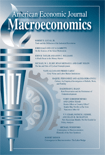
American Economic Journal-Macroeconomics
Scope & Guideline
Delivering High-Impact Research in Macroeconomics
Introduction
Aims and Scopes
- Macroeconomic Modeling and Policy Analysis:
The journal extensively covers macroeconomic modeling, with a strong emphasis on the implications of various models for economic policy, including monetary and fiscal policies. - Financial Economics and Stability:
Research often explores the interactions between financial markets and the macroeconomy, analyzing how financial frictions impact stability and growth. - Labor Economics and Employment Dynamics:
A significant focus is placed on labor market dynamics, including wage rigidity, employment outcomes, and the impacts of policies such as unemployment insurance. - Inequality and Economic Growth:
The journal addresses the relationship between income inequality and economic growth, examining how factors such as taxation and social assistance influence macroeconomic outcomes. - Quantitative Assessments and Empirical Evidence:
Papers typically employ quantitative methods, often utilizing large datasets to provide empirical evidence that informs theoretical models and policy discussions.
Trending and Emerging
- Heterogeneity in Economic Agents:
There is an increasing trend towards examining heterogeneity among economic agents, including differences in consumption patterns, investment behaviors, and responses to policy changes. - Impact of Digital Transformation on the Economy:
Research exploring the implications of digital technologies on productivity, labor markets, and economic growth is gaining traction, reflecting the ongoing digital transformation. - Environmental Economics and Policy:
Emerging themes related to environmental economics are becoming more prominent, with studies examining the macroeconomic impacts of climate change and environmental regulations. - Incorporation of Behavioral Economics into Macroeconomic Models:
There is a growing interest in integrating behavioral economics into macroeconomic frameworks to better understand decision-making processes and their implications for the economy. - Responses to Unconventional Monetary Policies:
The journal is increasingly publishing studies that analyze the effects of unconventional monetary policies, particularly in the wake of global financial crises and the COVID-19 pandemic.
Declining or Waning
- Traditional Business Cycle Theories:
There has been a noticeable decrease in research focused solely on traditional business cycle theories, perhaps overshadowed by emerging approaches that incorporate more complex interactions between sectors and agents. - Simple Models of Inflation Dynamics:
As the understanding of inflation dynamics has grown, simpler models that do not account for heterogeneity or complex frictions are becoming less common in recent publications. - Static Analysis of Fiscal Policies:
Research focusing on static analyses of fiscal policies is declining, with a shift towards dynamic models that consider long-term implications and interactions with other economic variables. - Single-Dimensional Labor Market Models:
Studies that utilize overly simplified labor market models are becoming less frequent as researchers increasingly recognize the importance of multi-dimensional factors affecting employment and wages.
Similar Journals
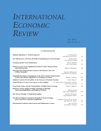
INTERNATIONAL ECONOMIC REVIEW
Pioneering insights that shape policy and practice.INTERNATIONAL ECONOMIC REVIEW is a prestigious journal dedicated to advancing knowledge in the fields of economics and econometrics. Published by Wiley in the United Kingdom, this journal boasts an impressive Q1 ranking in the 2023 category of Economics and Econometrics, reflecting its significant impact in the academic community. With a continued publication since its inception in 1979, it offers a platform for rigorous scholarly articles that address contemporary issues, theoretical developments, and empirical findings in economics. Although it does not currently offer open access options, the journal maintains broad accessibility through institutional subscriptions. Researchers, professionals, and students are encouraged to contribute to and engage with this leading publication to foster knowledge exchange and stimulate scholarly dialogue in economic research. With its commitment to high-quality scholarship, the INTERNATIONAL ECONOMIC REVIEW remains a vital resource for developing insights that inform both policy and practice.
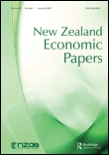
New Zealand Economic Papers
Driving impactful research for a deeper understanding of economic trends.New Zealand Economic Papers is a prominent academic journal dedicated to the field of economics, published by Taylor & Francis Ltd. With its ISSN 0077-9954 and E-ISSN 1943-4863, this journal has been a significant contributor to economic discourse since its inception in 1966, continuing to provide valuable insights through to 2024. As part of the third quartile (Q3) in the Economics, Econometrics and Finance category, it ranks at #165 out of 288 in Scopus, placing it within the 42nd percentile, demonstrating its respectable impact in the academic community. Although the journal does not offer open access, it remains a vital resource for researchers, professionals, and students interested in understanding economic dynamics, policy analysis, and applied econometrics, particularly in the context of New Zealand. The journal's commitment to rigorous research ensures that it continues to play a crucial role in shaping economic policy and academic thought across the globe.

POLITICKA EKONOMIE
Unveiling Insights at the Intersection of Economics and SocietyPOLITICKA EKONOMIE is a prominent academic journal published by VYSOKA SKOLA EKONOMICKA in the Czech Republic, focusing on the intersection of economics, sociology, and political science. Established to foster critical discourse within these fields, the journal's ISSN is 0032-3233, and it operates with an E-ISSN of 2336-8225. With a convergence history dating back to 1980, POLITICKA EKONOMIE has become a valuable resource for researchers and practitioners seeking insights into societal and economic dynamics. Although the journal is categorized in Quartile 4 for both Economics and Econometrics and Sociology and Political Science categories as of 2023, it continues to contribute significantly to empirical research and theoretical advancements. Researchers will find that while the journal is not open access, it welcomes submissions that engage with contemporary issues and debates, thereby promoting academic exchange and innovation in the social sciences.

FEDERAL RESERVE BANK OF ST LOUIS REVIEW
Navigating the complexities of global economic dynamics.The Federal Reserve Bank of St. Louis Review is a prestigious academic journal published by the Federal Reserve Bank of St. Louis, dedicated to disseminating high-quality research in the field of economics and finance. As a respected publication, it holds a significant position in its domain, as evidenced by its placement in the Q2 quartile in the Business and International Management category and ranking 210 out of 443 in Scopus. The journal offers an insightful platform for researchers, professionals, and students alike to engage with cutting-edge analyses and discussions, emphasizing topics relevant to monetary policy, economic trends, and financial stability. Although it operates without an Open Access model, its articles are instrumental for those looking to deepen their understanding of economic dynamics and policy implications in today’s global marketplace. With a commitment to fostering scholarly exchange, the Federal Reserve Bank of St. Louis Review remains a vital resource for advancing knowledge and practical solutions in economics and finance.

AUSTRALIAN ECONOMIC PAPERS
Empowering economists with cutting-edge research and analysis.Australian Economic Papers is a leading scholarly journal dedicated to advancing the field of economics, published by Wiley in the United Kingdom. With a robust legacy dating back to its inception in 1962, this journal has earned a reputable position in the academic community, reflected in its Q2 classification in the Economics, Econometrics and Finance category for 2023, and its rank of #76/288 in the Scopus database, placing it within the 73rd percentile. Australian Economic Papers seeks to publish rigorous research that addresses a diverse range of topics within economics, fostering a deep understanding of contemporary economic issues. It serves as an essential resource for researchers, professionals, and students aiming to explore innovative economic theories and empirical studies. While currently not available as an Open Access journal, its contributions are invaluable for those seeking to enrich their knowledge and engage with cutting-edge research in the dynamic field of economics.
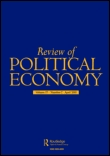
REVIEW OF POLITICAL ECONOMY
Illuminating Contemporary Issues in Political EconomyThe Review of Political Economy, published by Taylor & Francis Ltd, stands as a premier journal in the fields of Political Science and Economics, with an impressive 2023 Q1 ranking in both categories. With an ISSN of 0953-8259 and an E-ISSN of 1465-3982, the journal offers a dynamic platform for rigorous scholarly debate and critical analysis since its inception in 1989. Located in the United Kingdom, the journal focuses on current political economic issues, engaging researchers, professionals, and students alike. Its ability to converge disciplines has made it a vital source of insights for those navigating the complex intersections of politics and economics, firmly establishing its relevance in contemporary academic discourse. Although not an open access journal, its contributions to the field are invaluable, underlined by robust Scopus rankings that reflect its influence and quality. By connecting theory with practice, the Review of Political Economy continues to inspire and inform critical discourse within the global academic community.
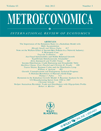
Metroeconomica
Pioneering Research that Inspires Economic Solutions.Metroeconomica is a prestigious journal published by WILEY, focusing on the dynamic fields of Economics and Econometrics. Known for its rigorous peer-review process, this journal prides itself on disseminating high-quality research that informs and inspires scholars and practitioners alike. With an impact factor reflective of its significance in the discipline, Metroeconomica is categorized in the Q2 quartile for 2023, representing its competitive standing among influential economics publications. Since its inception in 1949 and continuing through a converged publication period until 2024, it has contributed significantly to advancing theoretical and empirical knowledge in economics. Researchers can access its content through traditional avenues, encouraging a wide readership among academics and industry experts. As the journal continues to evolve with the changing landscape of economic research, it remains a vital resource for those seeking to explore contemporary economic issues and foster impactful discussions within the field.

Quantitative Economics
Driving innovation in economics through open-access research.Quantitative Economics is a leading open-access journal published by WILEY, dedicated to advancing the field of economics through rigorous quantitative analysis. Established in 2010 and based in the United States, this influential journal boasts an impressive Q1 rating in the 2023 category of Economics and Econometrics, reflecting its high impact and quality within the field. With a Scopus ranking of #222 out of 716 in the Economics and Econometrics category, it sits comfortably in the 68th percentile, underscoring its relevance to researchers and professionals alike. The journal accepts a wide range of submissions, including original research articles, methodological advancements, and comprehensive reviews, which contribute to the understanding and application of quantitative methods in economic research. By providing immediate open access to all published articles, Quantitative Economics ensures that vital findings are readily available to academics, policymakers, and students across the globe, enhancing collaboration and innovation within the discipline.
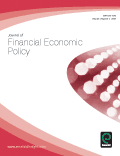
Journal of Financial Economic Policy
Connecting researchers and practitioners in the realm of financial economics.Journal of Financial Economic Policy is a premier academic journal published by EMERALD GROUP PUBLISHING LTD, focusing on the intersection of finance and economics. Through rigorous peer-reviewed research, the journal aims to advance understanding of financial policies and economic frameworks, addressing critical issues faced by financial markets and institutions. With an ISSN of 1757-6385 and an E-ISSN of 1757-6393, it serves as a reputable source of information for researchers, professionals, and students alike. The journal operates within the United Kingdom and is recognized for its contributions to the fields of economics and finance, achieving a Q3 category ranking in both disciplines as per the 2023 metrics. This places it within the top half of journals in its category according to Scopus ranks, demonstrating a solid impact in the academic community. Although it is not an open-access journal, the insights and analyses published are invaluable for those seeking to grasp complex financial phenomena and develop effective policies. The journal’s scope encompasses a wide range of topics relevant to contemporary finance and economic strategies, making it an essential resource for ongoing scholarly discourse and practical applications.
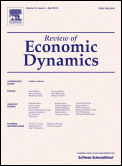
REVIEW OF ECONOMIC DYNAMICS
Exploring the Complexities of Economic BehaviorREVIEW OF ECONOMIC DYNAMICS, published by Academic Press Inc, Elsevier Science, is a leading academic journal in the field of economics and econometrics, holding a distinguished Q1 ranking in its category as of 2023. With an impactful focus on the theoretical and empirical analysis of dynamic economic systems, the journal seeks to advance our understanding of economic dynamics through innovative research that addresses contemporary issues and policy implications. The journal boasts a significant history of contributions from renowned scholars since its inception in 1998, and will continue to publish through 2025. Although it does not currently offer open access options, the journal serves as a crucial resource for researchers, professionals, and students who are keen to explore and engage with the latest findings in economic theory and practice. With a current Scopus rank of #280 out of 716 in the Economics and Econometrics category, the REVIEW OF ECONOMIC DYNAMICS remains an invaluable platform for scholarly discussion and insight into the complexities of economic behavior.